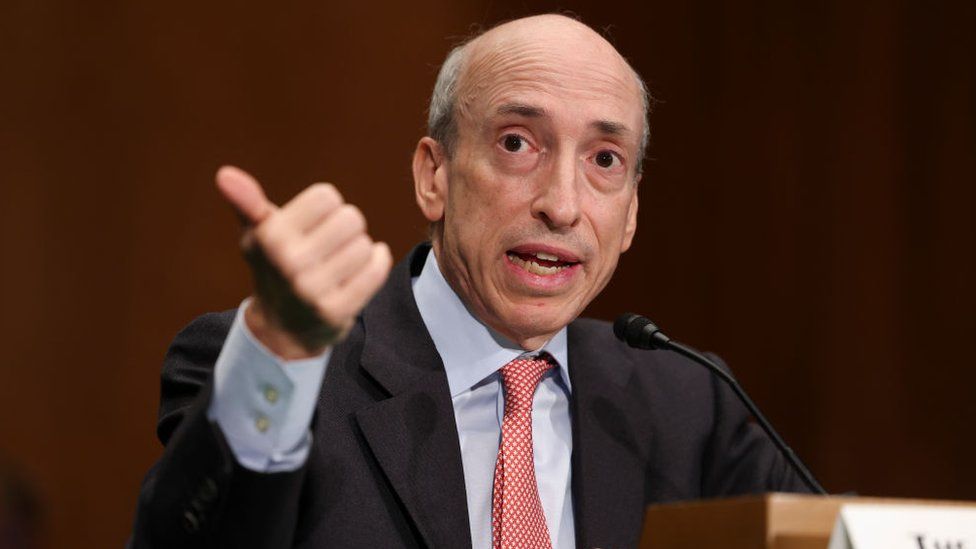
Is the US trying to kill crypto?
Is the US out to kill crypto?
Maybe.
Three years ago, the majority of the firms in the sector that Andrew Durgee’s company invested in were based in the US.
This year, he estimates that just one out of every 10 will be – a reflection of his firm’s judgement that the country has been growing increasingly hostile to digital assets such as cryptocurrencies and tokens.
“The administration really has a target on the industry,” says Mr Durgee, managing director of the crypto division for tech firm Republic. “The regulatory uncertainty makes the investments in the US higher risk.”
The sector was already under pressure, after prices of virtual currencies collapsed last year. Further damage came from the meltdown of several high-profile firms, including FTX, run by the so-called “Crypto King” Sam Bankman-Fried, whom prosecutors have accused of conducting “one of the biggest financial frauds” in US history.
Jolted by the turmoil, US regulators stepped up their policing of the sector, which authorities say has been on notice since at least 2017 that their activity runs afoul of US financial rules intended to protect investors.
The campaign has yielded a steady drumbeat of charges against crypto firms and executives, alleging violations ranging from failing to register properly with authorities and provide adequate disclosure of their activity to, in some cases, more damaging claims such as mishandling of consumer funds and fraud.
Bitcoin, which represents the biggest chunk of value in a sector in which thousands of currencies have circulated, is viewed by officials as a commodity, like gold. That means it has been largely unaffected by the current regulatory debate, which hinges on the legal question of what constitutes a “security” – an investment like a stock or bond that is overseen by the SEC.
The efforts have instead ensnared firms issuing tokens or coins to raise money – and increasingly the exchanges on which such digital assets are bought and sold, which often hold customer funds, execute trades and engage in other activity that is separated in traditional finance.
The crackdown culminated this month in legal actions against two of the biggest platforms: Coinbase and Binance.
Gary Gensler, the chairman of the Securities and Exchange Commission, defended the moves this month, comparing the state of affairs in the industry to the 1920s, before the US put in place many of the rules in question: “Hucksters. Fraudsters. Scam artists. Ponzi schemes. The public left in line at the bankruptcy court.”
Will Paige, research analyst for Insider Intelligence, says sentiment has soured significantly since 2021, when the industry was worth more than $3 trillion (£2.4tn) by some estimates and seemed poised for wider acceptance.
“It’s very much back on the fringe of finance,” he says. “Trust in the system is battered and it’s definitely gotten worse.”

In the wake of the lawsuits, customers yanked billions of dollars of funds. US banks limited their work with Binance, forcing it to stop accepting US dollars and Robinhood, the trading app, said it would stop listing certain assets named in the lawsuits, citing the “cloud of uncertainty” surrounding the tokens.
Critics accuse the SEC under Mr Gensler of hostile “regulation by enforcement” aimed at boosting his own political profile.
They say that despite repeated efforts by the industry to propose new rules, the agency has refused to acknowledge the distinctions between different types of crypto firms and the characteristics of the technology, like decentralised automated processing, that challenge existing frameworks.
“It’s been a very frustrating experience,” says Bart Stephens, managing partner of Blockchain Capital, a venture capital firm that has invested in hundreds of crypto firms, some of which he says have been struggling to find banks willing to do business with them. “There is no doubt a regulatory attack is going on.”
Bill Hughes, senior counsel of Consensys, a Texas-based software company that uses crypto’s blockchain technology, puts it even more bluntly: “The SEC has essentially determined that on its watch crypto shouldn’t exist in the United States anymore.”
Whether the SEC’s moves could actually kill the industry – in which by at least one estimate one in every six Americans has invested – is another question.
Crypto’s wider market value remains roughly a third of what it was at its peak. Trading volumes have plunged and developer interest is falling. Trust remains low. The failures in March of some of the few traditional banks willing to do business with it marked a further blow.
Hilary Allen, a law professor at American University, thinks crypto is inherently susceptible to boom-and-boost cycles and manipulation by insiders, and thinks it should be banned. She says the SEC’s actions could help re-confine crypto to the realm of tech enthusiasts, given the wider state of the industry.
“If we combine these enforcement actions with waning trust from the public, with possibly waning interest from venture capital, then maybe there isn’t a future,” she says.

But Mr Stephens, who has weathered two “crypto winters” already, says he thinks the future remains bright – if at risk of ending up overseas, given America’s current approach, which is seen as less friendly than other jurisdictions, including the UK and the EU.
He points to Bitcoin’s price, which is hovering around 2020 levels, but has gained significantly from the start of the year. Ether has also risen.
Some indicators tracked by venture firm and crypto-investor Andreessen Horowitz, such as the number of addresses active on blockchain and the number of smart contracts being executed, are also climbing.
“We’re not seeing founders stop forming new companies or protocols,” says Mr Stephens, who says Blockchain Capital invested more money in the first three months of 2023 than in any quarter in the previous 10 years, as prices fell and rival firms backed away from the sector.
Even if the sector thrives outside the US, losing the American market would severely limit its prospects, warns Gina Pieters, a crypto expert who teaches at the University of Chicago.
“It would be a mistake to think that the US… could kill the industry. It can absolutely, though, make the crypto industry smaller,” she says.
Many in crypto are hoping for a reprieve – from the courts, which could decide the SEC has overstepped its authority; from Congress, where draft legislation for the industry is under review; or from a change in the White House, which could prompt a policy reversal.
However those questions get decided, the issues are finally coming to a head, says Angela Walch, a research associate at the University College of London Centre for Blockchain Technologies.
“We are at a real inflection point,” she says. “The showdown is here.”
Comments (0)